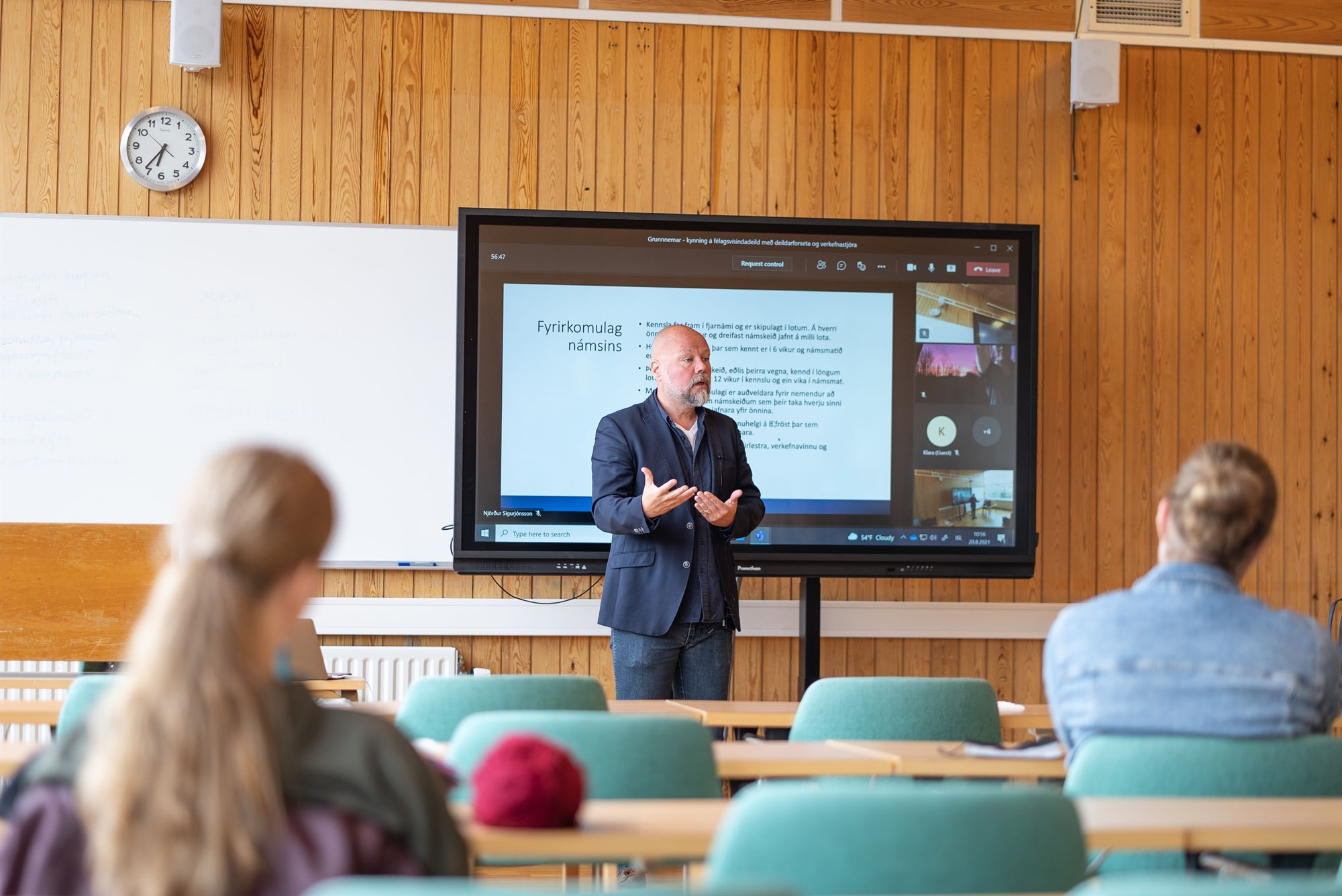Study techniques
Being a college student is demanding and therefore it is important to reassess one´s study habits. Effective study techniques can be the key to success and can save time, facilitate learning and reduce stress. Study techniques are an array of skills which boosts student's ability to study, retain and recall information. These techniques can be learned and applied to most fields of study and could include time management, goal setting, reading techniques, mnemonics, glossary techniques and a positive attitude. Continue to use learning techniques which have proven effective and try new methods that may facilitate your learning.

Effective study habits
Studies show that students who adopt effective study habits enjoy a greater success. Study techniques facilitate students when making plans, setting goals, organising projects, acquiring understanding of the study material and assessing their progress.
| Study tips | How to succeed |
| Habits of highly successful students | Studying when you have ZERO motivation |
| Stop doing this in the morning |
Time management
Distance learning offers great flexibility and students have more control over their time management. Each module is 7 weeks so time flies by if not used wisely. Being a stundent is hard work, and success depends on how active and invested the students are in their learning. Estimated work effort of students for each ECTS unit is about 20–30 hours, or 150–180 hours for a course of 6 ECTS units. Good time management is essential for getting a neccary overview and making your life easier.
Steps towards a better time mangement:
- Organise your module in advance by dividing your time between courses
- Read the syllabus carfully and note important dates
- Create a comfortable work environment where you can focus
- Set yourself goals for the week and review them regularly
- Organise your workload for each day
- Prioritise your tasks based on importance and difficulty
- Perform the difficult tasks during the time of day when your energy level is high
- Take short breaks when you loose your concentration
- Think positively and reward yourself for a job well done

Goal setting
In order to achieve success, it is essential to set goals wich provide support and are useful for achieving set targets.
SMART-ER goal setting is a good way to set goals. Think about whether the goal is ...
- Specific: Is the goal well defined? (What is it that you want to achieve, and why/how are going to execute it?)
- Measureable: How is the goal measured? (How much / how often / how do you know when the goal has been achieved?)
- Actionable: Create a plan to achieve the goal. (What do you need to do, and what steps are there to be taken in order to achieve it?)
- Realistic: Is the goal realistic in terms of scope and time?
- Time-based: The goal shall be completed by a specific time. It can be useful to break larger goals into smaller ones.
___________________________________________
- Evaluate: It is important that you review your goals regularly in order to measure progress and to determine whether prioritising needs to be reassessed and/or to review the plan.
- Reward: Encouragement and rewards play an important role in achieving set goals. Reward yourself for each step and celebrate when you reach your goal.
| SMART-ER goals | How to set goals |
| 80/20 rule for goal setting | Become limitless |
| How to set goals you'll stick to | Expand your mind to fit your goals |
Reading technique
Students are often required to cover a lot of reading material in a short amount of time. The modules go by quickly, and thus, it is important to follow the syllabus so you don't have to cram before exam which doesn’t cut it anymore. To understand the structure of a book is helpful to scroll quickly through it and pay attention to the table of content, e.g. how many chapters, preface, references, definitions and index. There are various reading strategies available, most of which entail skimming, reading and revising.
- Skimming: Before reading a chapter it's useful to skim to grasp the general idea. Read quickly throught the headings, abstract and conclusion at the end of a chapter, when available. It is also helpful to skim the first and the last paragraph in a section, images, charts and questions.
- Reading: Careful reading of a chapter after skimming enables you to test your knowledge. It can be useful to divide the chapter into smaller units and retell the material in your own words. When reading it helps to be engaged, e.g. use a highlighter, make a glossary or take notes in the margin of the paper.
- Revision: Studies show that when we acquire new knowledge, about 50–80% of it will be forgotten in 48 hours. To prevent this read rapidly through the material you just learned to confirm your knowledge and understanding, preferably within 24 hours.
| How to improve your reading skills | Active reading |
| Improve your reading speed | How to remember what you read |
| Effective reading with SQ4R | Hacks to remember everything you read |

Notes and revision
Students need to be able to recall all kind of information which can be a challenge since 50–80% of new knowledge is forgotten within 48 hours - the curve of forgetting. Revision is the most important tool for transferring new knowledge to the long-term memory. Good and well organized notes can be a useful tool when studying and will support the study material and facilitate revision. Everyone is familiar with some kind of methods, e.g. to highlight or make note of important points but in order to be useful, the notes must be used to proccess and memorise new knowledge.
| The curve of forgetting | Improve your memory |
| How to remember more of what you read | Learn to memorize things |
| How to memorize fast and easily | Effective flashcards |
| MindMup hugarkort |
Procrastination
Most of us can relate to avoid commencing a task and instead watched a popular TV show everyone is talking about, met up with friends, cleaned the apartment or just anything else than commencing that task? Some use calculated methods to deceive themselves in order to postpone the tasks, while others postpone them more randomly.
- There is plenty of time ...
- I work best under pressure ...
- This is so hard – I do not know where to start ...
- There is a game on tonight that I cannot miss ...
- I am going to snooze a little longer ...
We talk about procrastination when we avoid taking on tasks that may be difficult, uncomfortable, threatening or boring and keep postponing them. Procrastination usually begins to form at a young age and can develop into a habit. There can be various reasons for procrastination, e.g. limited self-esteem or belief in oneself, fear of making mistakes, the thought of failing and the self-deception of that postponing tasks will lead to greater success.
The truth is that postponing a task requires more energy and time than actually completing it. In order to tackle procrastination, you must stop waiting for that feeling of "being ready” and instead get on it straight away. This requires self-control, discipline and positive thinking.

Exam preparation and exam anxiety
Exams can be a stressful time for some but good study habits and effective study techniques can reduce stress and exam anxiety. Modarate stress can actually enhance our motivation and be helpful to focus and pay more attention. It is important to start exam preparation early to have the best chance of retaining the information needed and give it the meaning that will help you to excel in your exam.
Exam preparation
- Start your revision early and organize your notes
- Don't cram - several reviews are more effective
- Make a study plan so you will have time to cover all the material
- Choose a study location where you can focus and have all your books, exams and assignments at hand
- Know your exam and all the practical details
- Take regular breaks
- Look after yourself during study and exam time
- Good sleep, a healthy diet, exercise and relaxation are all factors that reduce stress
- It is not recommended to read in the late hours of the night before an exam
- Good preparation, a positive mindset and the belief in your own abilities is a strong advantage for an exam
Home exam
- Choose an examination location where you feel comfortable and where there is peace to work
- Have all documents well organised and at hand
- Take a deep breath, and calm your mind with positive thinking
- I am well prepared and will do my best
- Read instructions and questions carefully
- Quickly skim the exam questions in order to get a feeling for their scope
- Create a time plan and prioritise the questions based on importance
- Begin with answering the questions you know – do not dwell on the questions that you do not immediately know the answers to
- Use the time wisely, and allow for revision time at the end of the exam
Oral exam
- Good preparation is the key to success in an oral exam
- It is important to practice out loud and get feedback from others, e.g. friends, partners, co-students or record yourself
- Before the exam begins, take several deep breaths, believe in your own abilities and use positive thinking
- If you are very nervous inform the teacher
- Rember that the teacher is on your side, and it can be helpful to think that you are explaining the material to someone you trust
Multi-choice questions
- Read the instructions carefully
- Can there be more than one correct answer?
- Should you mark all correct choices?
- Will you be marked down for incorrect answers?
- Read the questions very carefully
- Begin with answering without looking at the response options
- Then read through all of the options and mark the correct one
- Begin with answering the questions that you feel you know the correct answer to
- Sometimes more than one option seems like the correct one
- When in doubt, use the elimination method to decrease the number of response options
- It is good to keep in mind that the initial answer that comes up in your mind is usually the correct one
Essay questions
- Read the question carefully – what are you being asked to do?
- It can be helpful to note key points on a piece of paper
- Create an outline: introduction – main text – conclusion
- Base your answer on facts, arguments and come to a conclusion
- Give clear and systematic answers, and make sure to answer the questions
How to reduce exam anxiety
Most people feel a little anxious or insecure during exam season and when submitting important projects. Mild anxiety can be positive, encouraging and lead to a greater success; however, chronic anxiety can hinder success and cause discomfort Examination anxiety is a feeling that is reflected in the fear of making mistakes, and the symptoms can be both physical and mental. Physical symptoms include rapid heartbeat, stiff muscles, sweat, discomfort in stomach and trouble sleeping. Mental symptoms include distorted thinking that consists of putting oneself down (I know I will fail; everyone is much better than me). There can be various reasons for examination anxiety, with the most common one being that the student is not enough prepared (perhaps juggling too many things at once, underestimating the work load, procrastinating, lacking an overview and organisation) or he has low self-esteem (unrealistic expectations of success, perfectionism and procrastination) The following tips can help to reduce exam anxiety:
- Work well and evenly over the module
- Use good time management, set goals and reassess them regularly
- Exercing, eating healthy and getting sufficient sleep can reduce stress and anxiety
- Keep calm and have a positive mindset (I am relatively well prepared and I can do this just like others)
- If you suffer from severe anxiety, it is important to seek professional assistance
Distance learning
When doing distance learning, it is important to maintain a good routine, take care to get good sleep, eat a range of nutritious food and exercise. It is important to choose a study location where one feels comfortable and is able to focus. Organise each module in the beginning. Visit Canvas and Ugla regularly and read the syllabus carefully to have overview of all tasks and important dates. Make a time schedule based on your circumstances (working while studying, family, hobbies, friends, exercise), and plan each day of the week so that you are able to divide the workload evenly over the whole module and complete your tasks in time.

